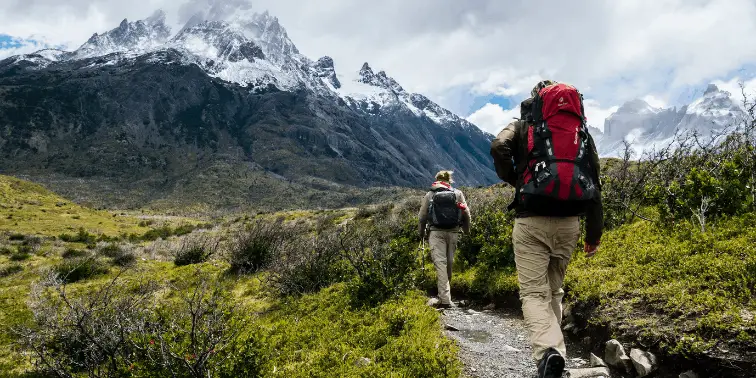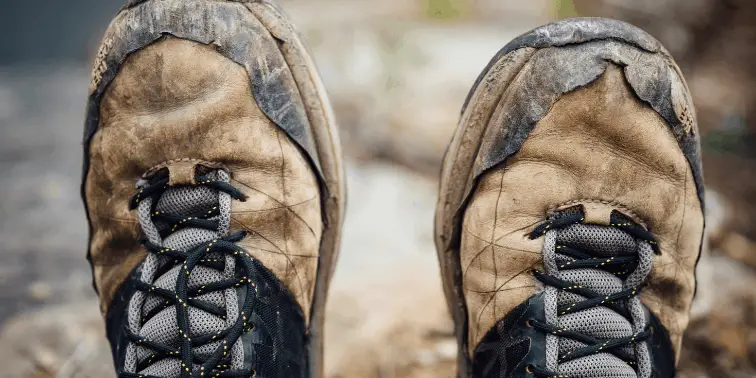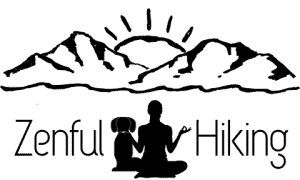Hiking can be one of the most rewarding activities anyone can do. The peace and tranquility you can experience on the trail can be great for your mental health and give you a chance to reset. Hiking is also a great form of exercise and can be an amazing bonding experience for family and friends.
However, for the beginner, hiking can also be a little overwhelming and intimidating. The idea of heading out into the wild is not natural for a lot us.
Because of this, we have compiled a list of hiking tips for beginners. These are all either questions we get asked a ton or mistakes we often see beginner hikers make. So if you’re new to this hiking thing then read on and by the end you’ll be ready to go out and conquer your next trail!
This page contains affiliate links. If you use these links to buy something I may earn a commission. Thanks.
10 Hiking Tips for Beginners
1. Don’t Wear Cotton!
Probably not what you were expecting as the first hiking tip for beginners, right? So what is the deal with cotton? Cotton as a material holds water, aka sweat, and doesn’t dry well. So as you’re making your way up the trail, your cotton t-shirt is accruing sweat.
When you reach the top (or just an opening in the trail) and get hit with the wind that usually accompanies open space, it can chill you to your core. Synthetic fiber will wick away sweat much better and help you drier and maybe a bit warmer.
2. Tell someone where you’re going and when you’ll be back
This is a super easy and really quick way to help you should something happen on the trail. All it takes is a quick text and you have someone on the ‘outside’ that will be aware really soon if you don’t arrive back safe. This can lead to authorities getting involved and getting you help. A really bad sprained ankle can become an emergency a couple miles out on a trail.
If no one notices you missing, you may end up spending a night (or two) getting yourself back to safety or getting found. Pre-loading someone to “notice” you’re missing when you do actually become missing can be a gamechanger. This is a great segue to number 3 which is…
3. Get yourself a hiking buddy
Having a hiking buddy is good for so many reasons. First off, having someone to experience the sights and sounds of nature with can make each experience that much more enjoyable. Next, from a safety standpoint, a hiking buddy can be enormously helpful in the event one of you gets hurt, if you encounter a wild animal or even if you happen to get lost.

I’m not saying you can’t hike solo. Many, many people hike solo everyday. In my opinion though, for a beginner just starting out, get yourself a hiking buddy if possible.
4. Research your Trail
This is probably the most practical, yet overlooked hiking tip for beginners. Having an understanding of your trail is so critical for you enjoying your hike and your overall safety. Make sure you’re selecting a trail that is appropriate for your (and anyone going with you) fitness level.
Most trails will have a rating system that will let you know how difficult the trail is. If it doesn’t, just check out how long the trail, how much elevation is involved and what the terrain will be.
Learn what the overall layout of the trail so you can have an idea of which direction you should be heading for the majority of your hike. Find out if there are any landmarks you can expect to see along the way so you know that you’re still on the correct trail.
Most issues that any hiker, beginner or advanced, will run into is because they either did not research the trail they were going on or they didn’t…
5. Bring the Proper Gear
Bringing the proper gear is an entire conversation unto itself. In fact, we’ve done an entire article on what to bring on a day hike. Similar to researching your trail, do a little research on what the appropriate gear is to bring based upon the hike you are planning. The length of the hike, in time and in miles, will have a large influence on the gear you bring.
As a beginner, if you are hiking a local trail that is 2 or 3 miles long, well populated and well maintained – the gear you will need is much different than if you’re hiking 15 miles up and down a mountain. Weather, which you should also be researching ahead of time, will also play a part in what gear you bring.
Having said that, never forget that weather can change in an instant and to try to be prepared for when and if it does.
Let’s briefly talk some specifics before we move on. Even when you’re hiking as a beginner, you should have a few essentials. Start with a good pack. Proper shoes and socks (more on those in a moment) is a must. Snacks (depending on length of the hike) and water. Simple first aid kit. Map (which you should know how to read) and compass. Headlamp. Way to start a fire in case of an emergency.
Those are basics. Again, depending on your hike, you may want to bring additional items.
6. Take Care of Your Feet
This goes hand in hand (or foot in foot… no? ok, bad joke) with number five. A bad blister that forms mid-hike can literally make every step of your hike miserable. Start by getting a good pair of trail shoes or hiking boots, depending on what your trail calls for. Hiking boots are great for trails where your going to encounter rocky terrain, lots of mud or if you plan to be off-trail.

If you’re going to be hiking a well-populated, well-maintained trail that will not involve any treacherous terrain, a good trail running shoe should do just fine. Make sure to break in your shoe by wearing it around the house or out in the yard a few times before heading out on that first trail.
In addition, a good pair of socks are often over looked by beginner hikers, but definitely shouldn’t be. Make sure your sock completely covers the height of your shoe so your shoe/boot doesn’t rub against your leg as you walk.
Lastly, socks should fit snug, but not tight. You don’t want a loose sock, because a loose sock will cause friction inside your shoe which will lead to a blister.
7. Water!
Bring water. This seems fairly obvious, but it has to be mentioned. A general guideline is about one liter for two hours of hiking you plan to do. This, of course, can change depending upon the weather and climate. In addition to bringing water, it is also a great idea to bring a way to purify water while you’re hiking.
Having some water purifying tablets to use on water from a stream can help you from having to carry all your water needs from the start.
Also, having an item like a LifeStraw that can purify water you drink straight from the source can come in really handy in an emergency situation. Both the tablets and LifeStraw and really small and will fit easily in your pack.
8. Sun Protection
This is one of the most common mistakes I see made by beginner hikers. Maybe I’m more sensitive to it (literally) cause of my Irish skin that doesn’t get along well with the sun, but I often hear about sunburn stories from other hikers.
Many beginner hikers assume that sun protection won’t be needed. After all they’re going to be in the woods with shade all day, right? This is generally simply not the case. On the large majority of trails, you’ll get plenty of sun to get red, depending on your tolerance to sunshine. Bringing a hat or putting on a little sunscreen can help save you an annoying burn afterwards.
9. Leave no Trace
Essentially this means – pick up your trash! We, as a hiking and outdoors community, take a lot of pride in maintaining the beauty of the nature and trails that we inhabit on a daily basis.
Not only for ourselves, but for the wildlife who call these trails their home. Make sure to clean up after yourself, pick up any trash and keep it with you until you get to a proper place to dispose of it. You should leave ‘only your footprints’ when you leave the trail.
10. Enjoy it!
All of these tips are important, but don’t forget the most important hiking tip not just for beginners – enjoy it! Don’t be in a rush. Stop often to take in the scenery. All too often we start hikes with too much of a focus on finishing the hike. The true enjoyment in a hike though is in the journey.
BONUS TIP – Hiking with Dogs

If you decide you want to take your dogs with you on the trail, first, research the trail to make sure dogs are allowed to go. (Learned that lesson the hard way once) Next, bring leashes. There can be a lot of distractions on trail, other hikers who may have a fear of dogs and many trails flat out require them. Bring water for them and poop bags!
We hope you enjoyed our hiking tips for beginners. If you still don’t feel ready to go hit the trail, browse around Zenful Hiking. We have lots of helpful articles on hiking info and our favorite gear to get you started.
If you do feel ready to hit the trail, then what are you waiting for??? Be safe and have fun!

